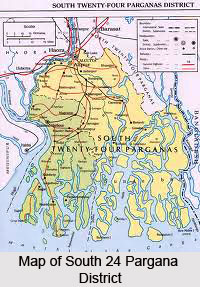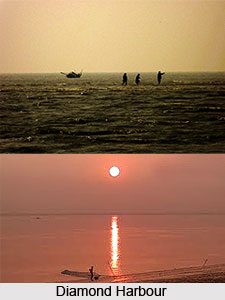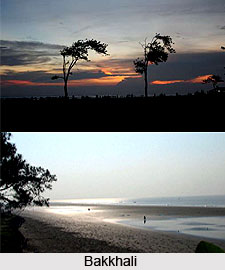 South 24 Parganas instead of being an urban fringe stretches from the border of Kolkata to the remoter zone.
South 24 Parganas instead of being an urban fringe stretches from the border of Kolkata to the remoter zone.
History of South 24 Parganas is documented since the British has achieved the grant of Diwani of Bengal. The battle of Plassey and the beginning of the British rule shares an important part in depicting the history and nomenclature of South 24 Parganas. The battle of Plassey concluded the British supremacy In Bengal and Mir Jafar who was consecrated as the puppet Nawab of the British, yielded to the company the right of 24 Mahals. The treaty by which the British were entitled as the sovereign lord of the Mahals, declares that all the areas to the south of Calcutta as far as the Culpee shall be under the Zamindary of the British". The tract of landed conceded to the British include the present area of South 24 Parganas.
History Of South 24 Parganas District
As the history of South 24 Parganas depicts, a district named "24 parganas" started taking shape according to the Clause no 2,3 & 9 under the Regulation Act of the 1793. Under those Clauses, the district of 24 Parganas include all those 24 Mahals, which have been ceded to the British. By integrating all those areas, the British established a single district with the name 24 Parganas for the administrative convenience. As far the history of 24 Parganas concerns, it existed principally as revenue collecting area and the civil and the criminal jurisdictions for 24 Parganas have been demarcated by the Britishgovernment in the Regulation Act.
 As is evident from the historical background of 24 Parganas, the original district came into existence during the British imperialism in India. Before the British, when Bengal was under the indigenous and the Muslim rulers, there was no separate administrative unit of 24 Parganas. Finally in 1986, 24 Parganas was again subdivided into North and south divisions. South 24 Parganas, from 1st March 1986, came to be existed as the separate functional unit of West Bengal Government.
As is evident from the historical background of 24 Parganas, the original district came into existence during the British imperialism in India. Before the British, when Bengal was under the indigenous and the Muslim rulers, there was no separate administrative unit of 24 Parganas. Finally in 1986, 24 Parganas was again subdivided into North and south divisions. South 24 Parganas, from 1st March 1986, came to be existed as the separate functional unit of West Bengal Government.
Economy of South 24 Parganas District
The Bay of Bengal is the principal source of the economy of South 24 Parganas. The confluence of river Ganga with the sea here forms a congenial physical feature for Pisciculture. Canning is the major center for the transaction of fish in the market. The commissioner agent receives the fish and sells them and the wholesalers transported them in the Kolkata auction market. The network of fish transaction largely supports the economy of South 24 Parganas.
Agriculture is the main stay of the people of the northern area. The northern tract of South 24 Parganas has the uniform landscape encourages the growth of agriculture. Rice, sugarcane, timber and betel nuts are the principal agricultural products. The agriculture mainly supports the local rural economy. A considerable amount of people draw their living from the agricultural sector.
Livestock breeding also shares a part in the economy of South 24 Parganas. Garole breed of Sheep and the Chinae Hans of Muscuovy ducks. The wool that is extracted fro the sheep are exported, which is also the source of the rural economy of South 24 Parganas.
Tourism of South 24 Parganas District
Presently the tourism industry has earned prominence in the pockets of the district. The tourism supplements a major part of the financial set up of South 24 Parganas.The tourism of south 24 Parganas supports the economy to a large scale presently. The tourism in the South 24 Parganas centers round the places like Sundarbans, Sajnekhali, bakkhali and Diamond Harbor.The tourism in Sundarban develops round the vast tract of forest and the swampy land forming the lower part of Ganga delta. The principal attraction of the Sundarbans is the network of estuaries and the Royal Bengal tiger.The Royal Bengal tiger is the only of its type has its abode in the Sundarbans of West Bengal. Sundarbans is named so because the area is infested with the "forest of sundari". The shallow swampy coastal area is crocodile- infested and is virtually inhabited. The world`s largest Delta region, Sundarbans spreads over two countries (India and Bangladesh) and over 54 islands. Just opposite to Kolkata, Sundarbans presents a unique ecosystem in this part of the world. Sundarbans is declared by UNESCO as the heritage place. It holds the largest number of wild tigers in its core.
 Sundarbans absorb the key interest about the tourism of South 24 Parganas.The scenic beauty and the bird sanctuary is the primary attention of the Sajnekhali division. The Mangrove Interpretation center is of immense interest to the visitors. There are watchtowers in the Sajnekhali region and in the adjacent parts.
Sundarbans absorb the key interest about the tourism of South 24 Parganas.The scenic beauty and the bird sanctuary is the primary attention of the Sajnekhali division. The Mangrove Interpretation center is of immense interest to the visitors. There are watchtowers in the Sajnekhali region and in the adjacent parts.
In the tourism industry, Bakkhali and Diamond Harbor earned popularity as the picnic spot mainly for the Calcuttans. The Bakkhali beach resort is only 132 kms from Kolkata. Very close to Bakkhali, there is Fraserganj beach resort, which is equally important as a tourist spot. Diamond Harbor constitute as the famous picnic spot because of its close proximity with Kolkata. The Diamond Harbor Road, which connects the town with Kolkata, has a number of lodges and resorts on the highway.
Gangasagar absorb the major interest of the tourism industry on the occasion of Makar Sankranti. The only tranquil place casting a pristine freshness at the confluence of the river Ganga with Sea has a lovely island called Sagardwip. It is a famous tourist spot, not only for its immaculate splendor, but it is traditionally a religious site. Thousands of devotees come to visit it and take a dip to wash away all the sins and offer worship in the temple of Kapil Muni on the occasion of Makar Sankranti. A big colorful fair, called Sagar Mela was organized on the event of that occasion.
The tourism industry today is earning prominence in the South 24 Parganas and at the same time, shares a significant part of the district`s economy.






